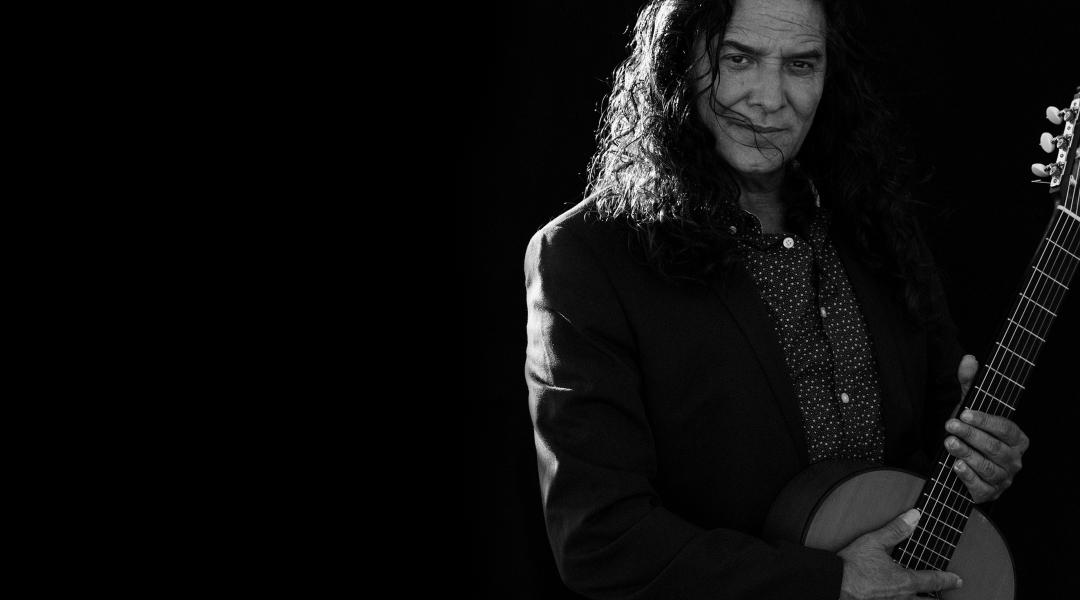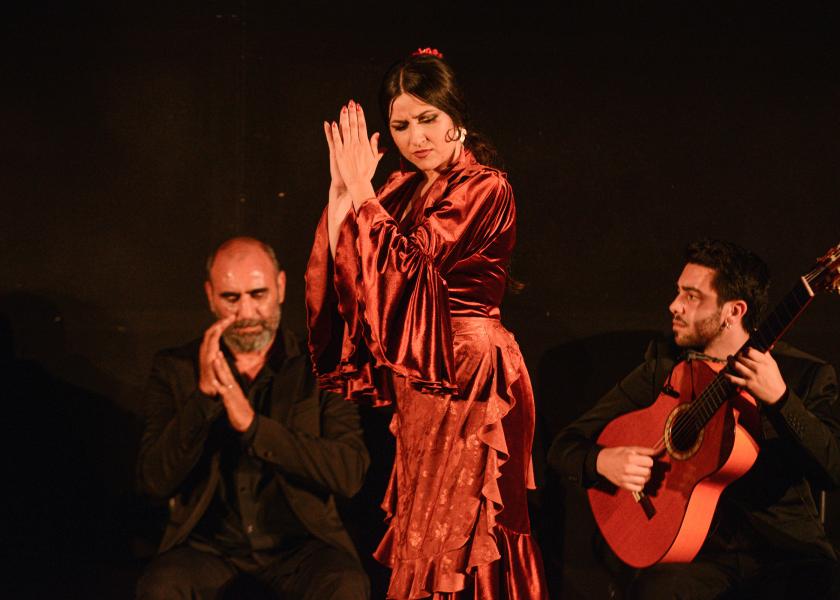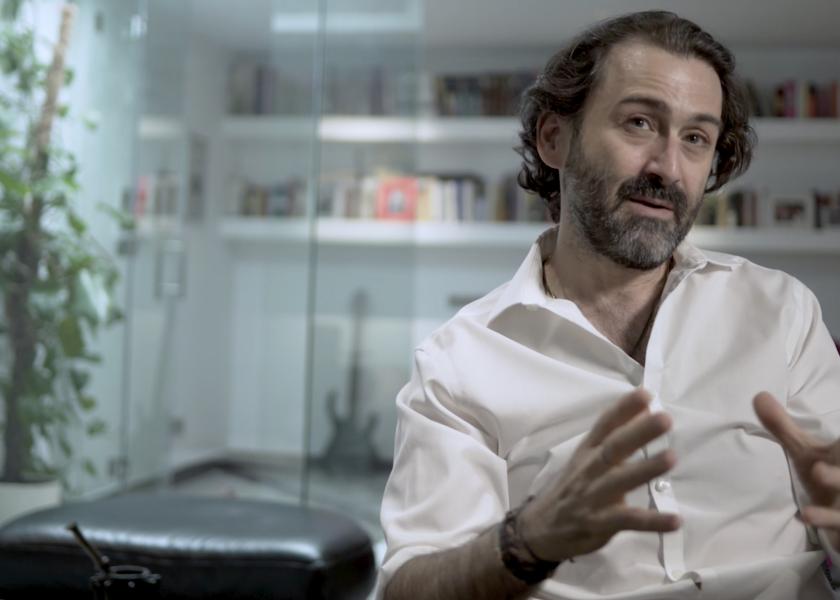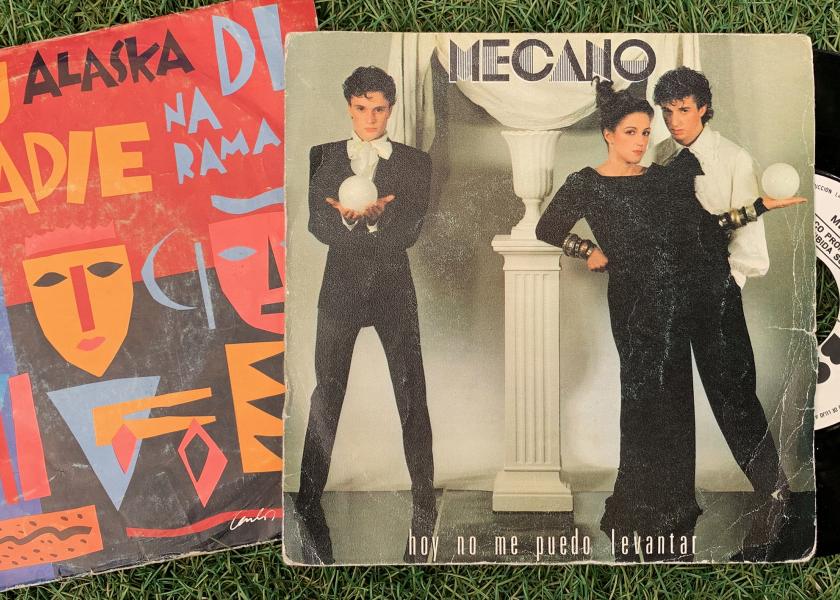Tomatito
“Flamenco Should Be Learned From Childhood”

Considered the best flamenco guitarist on the planet, Tomatito accepts the compliments with absolute humility. Because behind his talent are many hours of work. A good example of this is his upcoming 'El concierto de Aranjuez', an album the Almería-born musician has already been playing on stages all over Spain, proving that flamenco artists also know how to get classical.
As a child, he made something similar to a cardboard guitar with light bulb filaments serving as strings, and he followed his mother around the house forcing her to listen to his “concerts” that caused her headaches. Half a century has gone by, but José Fernández Torres, better known as Tomatito (Almería, 1958), still enjoys holding a guitar in his arms. What started as a game became not only a way of life and expression, but also pure art. He revolutionised flamenco alongside Camarón, whom he accompanied for 20 years. Now he travels the world playing music that, as he says, is and will always be part of the “marca España”. El concierto de Aranjuez, the symphonic album that will be released in the next few days, comes hot on the heels of De verdad, his record with singer José Mercé. He talks to us about it with great enthusiasm at the Flamenco On Fire festival in Pamplona, where he plays a concert with Mercé in which his son, José del Tomate, participates as well. The saga continues.
After Camarón died, you never wanted to record an album with another singer. Until José Mercé arrived.
I played with Camarón for 20 years, so after him, I had the feeling that my work with singers was done. Mercé and I have many friends in common who were always asking us why we didn’t make a record together. And here it is! As solo artists, we both have our own worlds, but we’ve had a lot of fun recording it. We reminisced about old times, playing styles like soleá and seguiriyas with just voice and guitar. I am delighted with this project.
You’re the best flamenco guitarist on the planet, but when you’re accompanying a singer, you put yourself at their service.
Accompanying someone makes you tolerant: the singer sets the pace for you, you are their lackey. We guitarists are like flamenco’s carpet: for the singers, for the dancers—they don’t have to know how to play the guitar, but we do have to know how to sing and dance in our minds in order to accompany them.
In the late seventies, you and Camarón revolutionised the tradition with La leyenda del tiempo, an album that not everyone understood, starting with the flamenco people themselves. To innovate, do you need to know the roots?
Ah yes, the purists did not like it one bit (laughs). If Camarón did that, it was because he knew and sang all the songs supremely well. The same thing happened with Enrique Morente when he made Omega, an album I also played on. To recreate what’s already been created, you have to know where you’re coming from. You can’t start building a house from the roof because, in the end, it will fall. What is done well, even if it’s not spectacular, is what remains.
On De verdad you and José Mercé revive traditional styles, as well as the seventies, which is when you arrived in Madrid. How do you remember that time?
I arrived in Madrid when I was almost 15. I met people who would later become great figures of my generation. I went to the Las Brujas venue and saw Manolo Sanlúcar and Terremoto de Jerez playing; when I visited the Café de Chinitas, Enrique Morente was there; and when I entered Los Canasteros, Dolores de Córdoba was playing. I started working in Torres Bermejas (where Camarón had been before me, accompanied by Paco Cepero) and Manuela Carrasco was up, who was just a girl back then, and Pansequito del Puerto, who was very young as well. For the young ones, that was school. It was a golden era for flamenco.
The both of you are flamenco greats, and you learned from others as great as you, yet you’ve always welcomed the new generations.
And why not! I’ve had great teachers: Camarón and Paco de Lucía. They never said, “This has to be done the way I do it.” You have to give change an opportunity in order to know where it leads to. Flamenco is wise, and there are new things that end up becoming great, that become part of it. It’s a kind of music that’s always moving—it’s not static. I’ve recorded El concierto de Aranjuez and there you can’t do anything else, because everything is established. And that’s the way it should be, because otherwise it looks like you’re disrespecting someone. But flamenco is improvisational, visceral, emotional.
"No matter how many things I learn in life, I’ll never stop being flamenco. They would have to drain all the blood out of me for that to happen"
Flamenco artists make something that others know is very difficult to do seem easy.
Of course it’s not easy. Mostly because you don’t know what you’re going to do. Yes, there is a structure—you know where to start and where you’ll end, but everything in between is up to you. Not even when I play something I’ve created myself is it always going to be the same; every day the music will be different. It also depends on the mood.
Do you think that new generations have it easier today than when you started out?
At my age, I think about how lucky I was to be born between two periods: that of the older generation, with people like Mairena and Caracol, and that of Camarón and Paco de Lucía, who represented the new generation. Young people are the future of flamenco: some will last, others won’t. Many will be called, and few will be chosen. But the youth always keeps everything going. And I’m delighted with all the artists that are emerging today.
Flamenco artists play sold-out shows everywhere they go. They occupy privileged spots in the great venues of so-called highbrow music, and yet, in our country, it often seems that the genre doesn’t receive all the attention it deserves.
It’s a matter of musical culture. Flamenco, as well as other styles, whether they be classical, jazz, or rock, is something we should be educated in from childhood. The education authorities—like in other countries—should impose a subject dedicated to music. It’s important that they give it the value it has because, from birth to death, you’re going to live with it. Otherwise, life would be very boring.
And what would that kid who’d drive his mother crazy playing a cardboard guitar think of the teacher Tomatito?
I get emotional when I remember that. The fact that I got interested in the guitar was the best thing that could happen to me. That kid thinks that, when he grew up, he behaved well, he cared about what he was doing. When I started, people called me a savage because I came from Almería or because I had always been around my granddad’s horses. But let there be no misunderstanding: I also learned to speak English! And no matter how many things I learn in life, I’ll never stop being flamenco. They would have to drain all the blood out of me for that to happen. That said, that stereotype of being born with a gift doesn’t mean that you have the ability or the permission to say that you’re a genius. What you have to do is study, be serious and responsible. Whether you get there or not is a different story, but you have to at least try and work hard. And hard workers are regarded highly and always get their reward.



